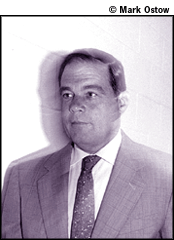June 8 - 15, 2000
![[Features]](/standard/image/headers/features_header.gif)
Politics
Staying above the fray
by Seth Gitell
While prospective candidates for governor, such as Steve Grossman and Warren Tolman, rigorously worked the floor of the state Democratic convention in Lowell last weekend and US Representative Martin Meehan acted as the event's host, Senate president Tom Birmingham quietly received delegates in a private room.
To some observers, Birmingham's approach suggests a reluctance to take part in the gritty glad-handing that comes with running for office. "He's very uncomfortable with retail politics," says one Democratic insider.
But Lou DiNatale, a senior fellow at the McCormack Institute at UMass Boston, says the difference between Birmingham and the others is only a matter of style, not a political shortcoming. "If it reinforces an imperial image, that may hurt," he says of Birmingham's strategy. "But by and large, picking up delegates and giving a sense of exclusivity is not a bad way to go." DiNatale also points out that in the context of a convention where one-third of the delegates represent labor interests and will support whomever their union leaders choose, Birmingham's decision makes sense.
Birmingham invited several groups of delegates into the locker room at the Paul Tsongas Arena to meet with him. Alison Franklin, a Birmingham aide, says he took questions from visitors for three hours. "It's a lot more substantive than going around talking to people at their seats," Franklin says. Plus, Birmingham did his own hand-shaking the night before the convention and at gatherings afterward.
Nevertheless, Birmingham's tactic suggests that he'd be fairly aloof as a candidate for governor. Despite a tough run for the Senate in 1990, Birmingham is most comfortable above the fray -- as exemplified by his shaky performance at this year's St. Patrick's Day breakfast in South Boston. He'll probably use his war chest for television ads stressing his work on education and would rely heavily on union support -- leaving the glad-handing to others.

